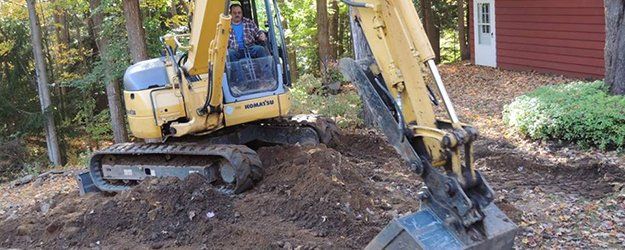Professional Septic Ohio - Relied On Septic Tank Experts in Ohio
Professional Septic Ohio - Relied On Septic Tank Experts in Ohio
Blog Article
Comprehensive Excavation Methods: Grasping the Principles for Success
In the world of building and construction and civil engineering, the importance of effective excavation strategies can not be overstated. The cautious preparation, precise implementation, and precise interest to information required in excavation projects demand a detailed strategy that encompasses various basic elements. From initial soil analysis to the application of safety measures and routine progress monitoring, mastering these core components is necessary for accomplishing success in any excavation endeavor. The real mastery lies not simply in recognizing these principles yet in perfectly incorporating them to navigate the complexities of excavation tasks with skill.
Understanding Excavation Job Preparation

Successful excavation jobs are built on the foundation of thorough and detailed preparation. The initial phase of any excavation job is the drawing board, where vital decisions are made that can substantially influence the end result of the project. Throughout this stage, it is vital to gather all pertinent information concerning the site, consisting of topographical surveys, soil composition, and any type of possible threats that may exist. Understanding the task scope, budget, and timeline constraints is important for creating a comprehensive excavation plan that makes sure the task's success.
One key facet of excavation task preparation is the development of a thorough timeline that outlines the series of turning points, tasks, and due dates. By meticulously considering all these elements during the planning stage, excavation projects can be implemented successfully and effectively, leading to successful end results - lancaster trenching.
Soil Evaluation and Website Assessment
Carrying out thorough soil analysis and site assessment is an essential action in the preparation stage of any excavation project. Dirt analysis involves establishing the composition, structure, and residential properties of the dirt at the excavation site. This details is vital for understanding the dirt's bearing ability, wetness web content, and capacity for disintegration, which are essential aspects in figuring out the excavation techniques and devices needed for the task.
Site examination exceeds dirt evaluation and incorporates a more comprehensive assessment of the overall site conditions. This evaluation consists of identifying any kind of prospective risks, such as below ground energies, ecological issues, or unsteady surface, that might affect the excavation process. By thoroughly evaluating the site, project supervisors can establish efficient excavation methods that focus on safety and security, efficiency, and environmental protection.
Utilizing sophisticated technologies like ground-penetrating radar, dirt tasting, and drone studies can boost the accuracy and performance of dirt analysis and website evaluation. Spending time and resources in these preliminary actions can ultimately save time and avoid costly hold-ups or difficulties during the excavation process.
Equipment Choice and Utilization
Reliable excavation jobs count heavily on critical equipment choice and utilization to make sure optimal performance and efficiency. Choosing the right discover here devices for the work is crucial in making best use of performance and decreasing downtime. Elements such as the sort of dirt, depth of excavation, and job extent play a significant duty in determining the most suitable tools for the job available.

In addition to selecting the ideal devices, correct utilization is crucial to project success. Operators should be educated to manage the equipment safely and successfully - dump truck companies in ohio. Normal maintenance checks and timely repair services aid avoid malfunctions and ensure consistent efficiency throughout the project
Precaution and Regulations Compliance
In the realm of excavation jobs, prioritizing precaution and conformity with guidelines is vital to guaranteeing a lawfully sound and safe and secure functional atmosphere. Security procedures incorporate a range of read this practices, consisting of conducting detailed website evaluations, carrying out correct signs and barriers, and supplying ample safety training for all personnel associated with the excavation process. Adherence to laws, such as OSHA needs in the USA, makes sure that the excavation project satisfies the necessary requirements to shield employees, spectators, and the surrounding atmosphere.

Surveillance Progress and Adjusting Strategies
How can project managers effectively track the improvement of excavation projects and adjust their strategies as necessary to optimize end results? Monitoring development is important for guaranteeing that excavation projects stay on track and satisfy deadlines.

Verdict
In conclusion, grasping the fundamentals of extensive excavation approaches is crucial for the success of any task. By recognizing project preparation, evaluating soil and website problems, picking proper devices, complying with security policies, and checking progression, project supervisors can make certain a smooth and effective excavation process. Executing these strategies will certainly cause effective results and reduce prospective risks or obstacles during the excavation task.
The preliminary phase of any type of excavation job is the planning phase, where crucial choices are made that can substantially impact the end result of the job. Recognizing the task spending plan, scope, and timeline restraints is important for creating a thorough excavation plan that ensures the job's success.
Just how can project supervisors successfully track the innovation of excavation jobs and adapt their approaches appropriately to maximize outcomes? By carefully keeping track of progress and being willing to adjust methods, task managers can improve the general success of excavation tasks.
By recognizing project preparation, examining dirt and site conditions, selecting ideal devices, conforming with security laws, and keeping track of development, task managers can make sure a effective and smooth excavation useful site process.
Report this page